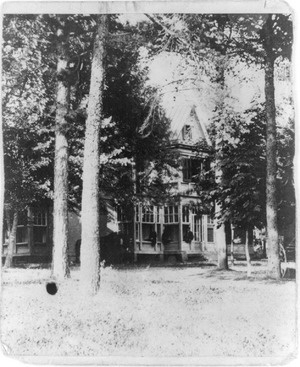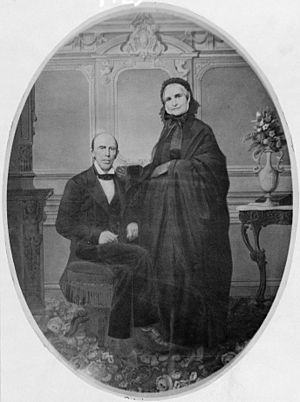Francis Preston Blair facts for kids
Quick facts for kids
Francis Preston Blair
|
|
|---|---|
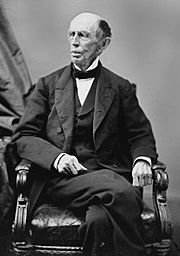
Blair c. 1870
|
|
| Born | April 12, 1791 |
| Died | October 18, 1876 (aged 85) Silver Spring, Maryland, U.S.
|
| Alma mater | Transylvania University |
| Occupation | Journalist, politician |
| Years active | 1830–1849 |
| Known for | Founder of the Republican Party |
|
Notable work
|
Hampton Roads Conference (1865) |
| Political party |
|
| Spouse(s) |
Eliza Violet Gist
(m. 1812) |
| Children | 5 (incl. Montgomery, Elizabeth, and Francis Jr.) |
| Signature | |
|
.
|
|
Francis Preston Blair Sr. (born April 12, 1791 – died October 18, 1876) was an American journalist and newspaper editor. He was a very important person in American politics. He advised several U.S. presidents from different political parties.
Blair was an early member of the Democratic Party. He strongly supported President Andrew Jackson. He helped Jackson win the state of Kentucky in the 1828 presidential election. From 1831 to 1845, Blair was the main editor of The Washington Globe. This newspaper was the main way the Democratic Party shared its ideas.
Blair was a key advisor to President Jackson. He was part of a group of unofficial advisors called the "Kitchen Cabinet". Even though he owned enslaved people in Kentucky, Blair later opposed letting slavery spread into new western areas. He supported the Free Soil Party in the 1848 election.
In 1854, he left the Democratic Party. He disagreed with the Kansas–Nebraska Act, which allowed new territories to decide on slavery. Blair then helped start the Republican Party. He advised President Abraham Lincoln during the American Civil War. In 1861, Lincoln sent Blair to offer command of a large Union army to Colonel Robert E. Lee. Lee said no and joined the Confederacy instead. Blair also helped set up the Hampton Roads Conference in 1865. This meeting tried to end the war but failed.
After the Union won the war, Blair became unhappy with "Radical Reconstruction". This was a policy pushed by many Republicans. He eventually left the Republican Party and rejoined the Democrats. His son, Francis Preston Blair Jr., ran for vice president as a Democrat in the 1868 election but lost. Blair died in 1876 when he was 85 years old.
Contents
Early Life and His Work
Blair was born in Abingdon, Virginia. His father, James Blair, was a lawyer who became the Attorney General of Kentucky. Francis grew up in Frankfort, Kentucky. His family called him Preston. He graduated from Transylvania University in 1811. He studied law and became a lawyer in 1817. However, he chose not to practice law.
Instead, he became a journalist. He wrote for a newspaper called the Frankfort's Argus. Blair was a strong supporter of Andrew Jackson. He helped Jackson win Kentucky in the 1828 presidential election. In 1830, he became the editor of The Washington Globe. This newspaper was the official voice of Jacksonian democracy, a political movement led by Andrew Jackson.
As editor and a member of Jackson’s unofficial advisory group, the "Kitchen Cabinet", Blair had a lot of power in national politics. The Washington Globe was the government's main newspaper until 1841. It was the main newspaper for the Democratic Party until 1845. That is when Blair stopped being its editor. He also ran a printing business that published important government documents. This included the daily record of what happened in Congress, called The Congressional Globe.
While working in Washington, Blair bought a house in 1836. This house later became known as the Blair House in Washington, D.C.
His Political Career
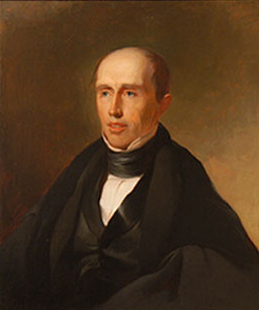
Blair supported James K. Polk in the 1844 presidential election. However, he did not get along well with Polk. He was forced to sell his share of The Washington Globe. In 1848, he actively supported Martin Van Buren. Van Buren was the candidate for the Free Soil Party.
Later, in 1852, Blair supported Franklin Pierce. But he became unhappy with Pierce's government. This happened after Pierce supported the Kansas–Nebraska Act. This act allowed people in new territories to decide if they wanted slavery. Blair, along with other Democrats who opposed slavery, helped create the new Republican Party.
He led the first meeting of the Republican Party in Pittsburgh on February 22, 1856. He helped bring together different groups like Whigs, abolitionists, free-soilers, and nativists to form the new party. He used his political skills to build support for this new party.
At the 1856 Republican National Convention, Blair helped get John C. Frémont nominated for president. Frémont was married to the daughter of Blair's old friend, Thomas Hart Benton. At the 1860 Republican convention, Blair first supported Edward Bates for president. But when it was clear Bates would not win, Blair supported Abraham Lincoln.
Blair gave advice to Lincoln. Both of Blair's sons were trusted by the president. Francis Blair became a Union general. Montgomery Blair joined Lincoln's cabinet. On April 17, 1861, just after Fort Sumter surrendered, Lincoln asked Francis Blair to offer Colonel Robert E. Lee command of the Union Army. The next day, Lee visited Blair. Lee turned down the offer, saying he could not fight against his home state of Virginia.
After Lincoln's re-election in 1864, Blair believed his past friendships with Confederate leaders, like Jefferson Davis, could help end the war. With Lincoln's permission, he went to Richmond twice. He convinced President Davis to send representatives to talk with the United States. This led to the Hampton Roads Conference on February 3, 1865. However, the meeting did not end the war.
During the Reconstruction Era, Blair wanted the Southern states to rejoin the Union quickly. He did not want to place many burdens on them. He spoke against the Radical Republicans' plans for rebuilding the South. He became a political friend of President Andrew Johnson. Eventually, Blair rejoined the Democratic Party.
Later Years
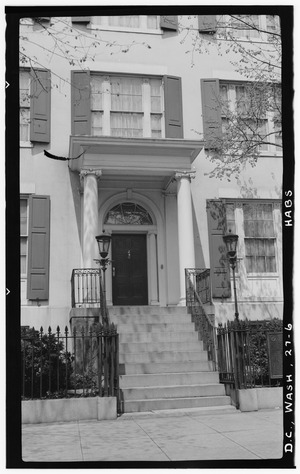
Preston Blair made Washington, D.C. his permanent home after buying a brick house in 1836. This house became known as the Blair House. In 1840, Blair found a special spring near what is now Silver Spring, Maryland. He liked the area so much that he bought land there. In 1849, he built a large summer home he called The Silver Spring.
His son James, a naval officer, and his wife Mary lived in a small house on the property called The Moorings. Blair's other son, Montgomery, built his own summer house nearby called Falkland. This house was burned down in 1864 during a Confederate attack led by General Jubal Early.
In 1854, Blair gave his Washington, D.C. house to his son Montgomery. He then moved permanently to The Silver Spring. After Blair died, his daughter Elizabeth inherited the house for her lifetime.
Even though he had enslaved people working in his home, Blair became convinced that slavery should not spread to new areas. This was after the Mexican–American War. By 1862, Blair told the enslaved people he owned that they could leave if they wanted. He later said that almost all of them chose to stay and work as servants.
After the Civil War, Blair put all his political hopes in his son, Francis "Frank" Blair. Frank ran for vice president in 1868 and became a U.S. Senator in 1871. Frank died in 1875. Francis Preston Blair Sr. died a year later at his home in Silver Spring, Maryland, at age 85.
Family Life
Francis married Eliza Violet Gist on July 21, 1812. They had three sons: Montgomery Blair (1813–1883), James L. Blair (1819-1852), and Francis "Frank" Preston Blair, Jr. (1821–1875). They also had two daughters: Juliet Blair (1816-1819) and Elizabeth Blair (1818-1906).
Montgomery and Francis became important figures in American politics. His third son, James, was a naval officer. He made a lot of money during the California Gold Rush but died young. Blair's daughter, Elizabeth, married Rear Admiral Samuel Phillips Lee. She was also a close friend of Mary Todd Lincoln.
Blair's nephew, Benjamin Gratz Brown (1826–1885), was also involved in politics. He became a U.S. Senator and Governor of Missouri. His grandson, Blair Lee I (1857-1954), became a U.S. Senator from Maryland.
His Legacy
As the editor of The Washington Globe for 15 years and publisher of The Congressional Globe, Preston Blair became a very important political figure during the Jacksonian Era. He was an unofficial advisor to presidents Andrew Jackson and Martin Van Buren. He wrote about republicanism and democracy as important national ideas. This helped grow a popular feeling of "Americanism" at the time.
Blair kept his political influence during Van Buren's presidency. But then he started to lose power as the pro-slavery part of the Democratic Party grew stronger. Because of this, he helped start the new Republican Party in 1854.
When the Civil War began, he personally delivered Lincoln’s offer to Robert E. Lee to lead all the Union armies. Lee turned it down. During the war, Blair was an unofficial political advisor to Lincoln. After Lincoln was re-elected, Blair organized the Hampton Roads Conference. Peace terms were discussed with the Confederates, but no major issues were solved. After the Civil War, he disagreed with the "radical" way Congress wanted to rebuild the South.
William Ernest Smith, a history professor, wrote in 1933 that Francis Preston Blair and his two sons, Francis and Montgomery, had a longer period of influence in American politics than almost any other family, except the Adams family. Two of Blair's three sons, Montgomery Blair and Francis Preston Blair, Jr., were important in American politics. His daughter, Elizabeth Blair Lee, was a close friend of Mary Todd Lincoln. Blair's home in Washington, D.C., is now part of the President's Guest House complex.
The city of Silver Spring, Maryland got its name from Blair's estate. Of the three houses connected to the Blairs in Silver Spring, only James Blair's house survived. James and Mary Blair's daughter, Violet Blair Janin, left the house for public use in her will. She renamed it Jesup Blair House to honor her brother. It is now in the center of Blair Park in Silver Spring.
In 1885, a new school was renamed the "Blair School" in honor of Francis P. Blair, Sr. The school closed before 1978. The building is now a housing facility called Blair House.
Images for kids
-
.
Francis Preston Blair's signature
 | Tommie Smith |
 | Simone Manuel |
 | Shani Davis |
 | Simone Biles |
 | Alice Coachman |


